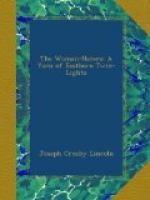Brown was in neither of the light towers, and Seth began to be worried about him. He descended to the yard and stood there, wondering what on earth could have happened. Then, looking across the cove, he became aware that his wife was standing on the edge of the bluff, making signals with both hands.
He opened his mouth to shout a question, but she frantically signaled for silence. Then she beckoned. He ran down the path at full speed. She met him at the other side of the cove.
“Come here!” she whispered. “Don’t say a word, but just come—and look.”
He followed her, crept close to the bungalow window and peeped in. His helper, “John Brown,” and Miss Ruth Graham were seated at the table. Also the substitute assistant was leaning across that table with the young lady’s hand in his; the pair were entirely oblivious of anything in the world except each other.
A few moments later a thunderous knock shook the bungalow door. The knock was not answered immediately; therefore, Seth opened the door himself. Miss Graham and the lightkeeper’s helper were standing some distance apart; they gazed speechlessly at the couple who now entered the room.
“Well,” observed Seth, with sarcasm, “anybody got anything to say? You,” turning to the young man, “seems to me you ought to say somethin’. Considerin’ a little agreement you and me had, I should imagine I was entitled to some triflin’ explanation. What are you doin’ over here—with her? Brown—”
The young gentleman came to himself with a start. He walked across to where Miss Graham was standing, and once more took her hand.
“My name is not Brown,” he said firmly. “It is Brooks; and this is the young lady I am to marry.”
He naturally expected his superior to be surprised. As a matter of fact, he was the surprised party. Seth reached out, drew the bungalow housekeeper toward him, and put his arm about her waist. Then he smiled; and the smile was expressive of pride, triumph, and satisfaction absolute.
“Atkins!” gasped Brooks.
“My name ain’t Atkins,” was the astonishing reply; “it’s Bascom. And this,” indicating by a tightening of his arm the blushing person at his side, “is the lady I married over five year ago.”
After the stories had been told, after both sides had told theirs and explained and been exclaimed over and congratulated, after the very last question had been asked and answered, Brown—or Brooks—asked one more.
“But this other fellow,” he queried, “this brother-in-law—By George, it is perfectly marvelous, this whole business!—where is he? What has become of him?”
Seth chuckled. “Bennie D.?” he said. “Well, Bennie D. is leavin’ Eastboro on the noon train. I paid his fare and give him fifty dollars to boot. He’s goin’ somewhere, but he ain’t sartin where. If you asked me, I should say that, in the end, he’d most likely have to go where he’s never been afore, so far’s I ever heard—that’s to work. Now—seein’ as the important business has been talked over and settled—maybe you’ll tell me about the lights, and how you got along last night.”




